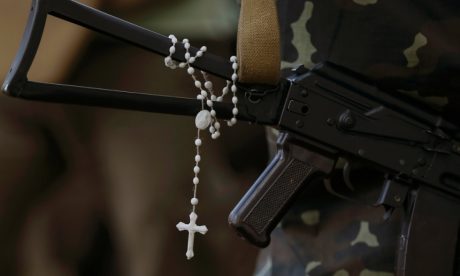Pope Francis said, “Fundamentalism is a sickness that is in all religions … Religious fundamentalism is not religious, because it lacks God. It is idolatry, like idolatry of money … We Catholics have some — and not some, many — who believe in the absolute truth and go ahead dirtying the other with calumny, with disinformation, and doing evil.”
We are seeing something close to a global epidemic of fundamentalism. Pope Francis is right: “Fundamentalism is a sickness that is in all religions.”
And it strikes at the heart of the common good, because it prevents people from growing as individuals and contributing to the welfare of others.
Fundamentalism is “a religion of rage.” Fundamentalists are people who are outraged when they see the world around them disregarding their revered religious values.
They respond in dangerously simplistic but militant ways to fears that they will lose their identity. They use words, or recourse to the ballot box, or, in extreme instances, bullets and bombs. Those who dare to question them are intolerantly scapegoated as enemies of the truth.
REACTING TO CULTURAL CHAOS
Fundamentalist movements are most active and culturally apparent whenever there are periods in which radical political, social or economic changes cause cultural trauma in a nation as a whole or in smaller institutions or communities.
These changes threaten to devastate treasured personal and cultural identities and respected moral values. Feelings of bewilderment and frustration result. People then search for quick explanations of what is happening and ways out of their overwhelming confusion. The atmosphere is ready for the unsophisticated solutions offered by fundamentalist populist and often demagogic leaders.
For most people, fundamentalism in the modern world has become synonymous with a radical form of Islam. Islamic fundamentalism has replaced communism as the specter plaguing Western minds.
It is a menace that looms ever larger following the Sept. 11, 2001, terrorist attacks on New York and Washington D.C.5 and the more recent terrorist assaults in London, Paris, Brussels, Orlando, Istanbul, Baghdad, Dhaka, Nice and Saint-Etienne-du-Rouvray and the ostensible inability of the Western nations to destroy the clandestine and brutal al-Qaeda network and the Islamic State (ISIS).
In the Middle East, Islamic extremists are killing fellow Muslims and persecuting, even murdering, Christians and other minorities. Continue reading
Sources
- Catholic Health Association of the United States, article by Rev. Gerald A. Arbuckle, SM, Ph.D., a cultural
anthropologist and author. - Image: Oduor Oduku
